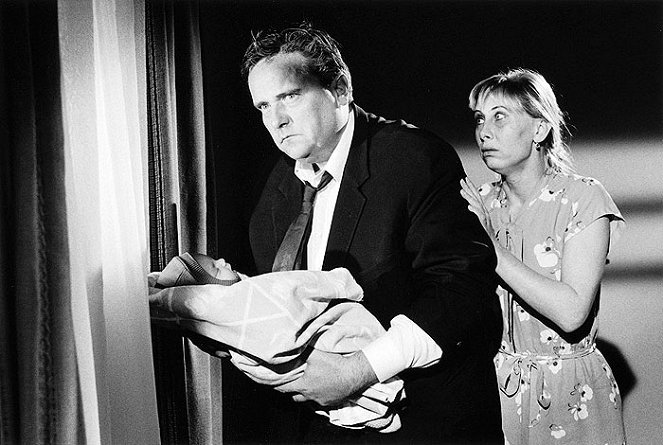Ohjaus:
Aki KaurismäkiKäsikirjoitus:
Aki KaurismäkiKuvaus:
Timo SalminenSävellys:
Anssi TikanmäkiNäyttelijät:
Sakari Kuosmanen, Kati Outinen, André Wilms, Markku Peltola, Elina Salo, Ona Kamu, Outi Mäenpää, Tuire Tuomisto, Tatiana Soloviova, Esko Nikkari (lisää)Suoratoistopalvelut (1)
Juonikuvaukset(1)
Juhani Ahon klassisen kolmiodraama Juhan mykkäelokuvasovitus kertoo maanviljelijäpariskunnasta – Juhasta (Sakari Kuosmanen) ja hänen vaimostaan Marjasta (Kati Outinen) –, joiden yhteinen arki häiriintyy kun kaupunkilaisviettelijä Shemeikka (André Wilms) ilmestyy yllättäen heidän elämäänsä. Luottavainen Juha ei hahmota mitä on tapahtumassa ennen kuin on liian myöhäistä ja kaupungin valoista haaveileva Marja on lähtenyt petollisen Shemeikan matkaan. Marja ajautuu nopeasti osaksi tämän surkeaa haaremia ja Juha lähtee vaimonsa perään kosto mielessään. Löytäessään viimein Marjansa Juha hyökkää kohti roistoja ja haavoittuu kuolettavasti, onnistuen kuitenkin tappamaan Shemeikan kirveellään. Ohjaajan uran julmimmassa lopetuksessa Juhan kuoleva ruumis hautautuu kaatopaikan jätevuorten keskelle, lokkien ja rottien seuratessa tuota surullista näytelmää. (Pirkanmaan elokuvakeskus)
(lisää)Arvostelut (1)
The story is somewhere on the level of calendar moralities about seduced women, wicked bourgeoisie and innocent rural areas from the 19th century (Juhani Ahoa’s book is said to belong to Finnish neo-romanticism), it is all the more beautiful to observe in Aki’s work a kind of strange ruthlessness and toughness which culminates in a cruel final scene. It is a strange shift from pure optimistic naivety to severe pessimism and the alienation of the ending. Juha is beautiful for its symbolic legibility, the exaggeration and the special tension between the archaic ethos of rendering and a purely (still) current topic. By the way, perhaps the most of all the films, the Kaurismäki desexualization stands out here, as if men and women functioned mainly in the category of innocence vs. corruption. Juha thus fits perfectly into Aki's world, only deliberately externally externalizing some previously hidden elements. As in silent films, gestures are not made here for pragmatic reasons, but only for their aesthetic beauty. In this, the viewing experience with Juha is particularly liberating, because it frees us from the need to seek context and social justification for tragic events. It is a narrative for the joy of the narrative. Film for the joy of film. A bitter search for lost purity. Nothing more, nothing less.
()

